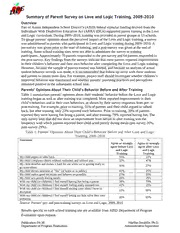
ERIC ED619419: Summary of Parent Survey on Love and Logic Training, 2009-2010. Publication 09.38 PDF
Preview ERIC ED619419: Summary of Parent Survey on Love and Logic Training, 2009-2010. Publication 09.38
Summary of Parent Survey on Love and Logic Training, 2009–2010 Overview Part of Austin Independent School District’s (AISD) federal stimulus funding derived from the Individuals With Disabilities Education Act (ARRA IDEA) supported parent training in the Love and Logic curriculum. During 2009–2010, training was provided to parent groups at 13 schools. To gauge parents’ opinions about the perceived impact of the Love and Logic training, a survey was administered to parents who participated in Love and Logic training during 2009–2010. A pre-survey was given prior to the start of training, and a post-survey was given at the end of training. Some school training sites were not able to administer the survey to training participants. Approximately 70 parents responded to the pre-survey and 64 parents responded to the post-survey. Key findings from the surveys indicate that most parents reported improvements in their children’s behavior and their own behavior after completing the Love and Logic training. However, because the sample of parents trained was limited, and because no analysis of actual student behavior records was made, it is recommended that follow up occur with these students and parents to obtain more data. For example, project staff should investigate whether children’s improved behavior was maintained and whether parents’ parenting practices and perceptions remained positive in the subsequent school year. Parents’ Opinions About Their Child’s Behavior Before and After Training Table 1 summarizes parents’ opinions about their students’ behavior before the Love and Logic training began as well as after training was completed. Most reported improvements in their child’s behaviors and in their own behaviors, as shown by their survey responses from pre- to post-training. For example, prior to training, 55% of parents said their child argued or talked back, but after training, only 23% reported such behavior. Prior to training, 39% of parents reported they were having fun being a parent, and after training, 79% reported having fun. The only survey item that did not show an improvement from before to after training was the frequency with which parents reported their child acted poorly during meals (pre-survey 20%, post-survey 29%). Table 1. Parents’ Opinions About Their Child’s Behavior Before and After Love and Logic Training, 2009–2010 Statement % % Agree or strongly Agree or strongly agree before Love agree after Love and Logic and Logic Training Training My child argues or talks back. 55% 23% My child completes chores without reminders and without pay. 32% 47% My child dawdles and makes it hard for me when we’re getting ready to 35% 27% go somewhere. My child throws tantrums or “fits” (at home or in public). 41% 25% My child makes good decisions and behaves responsibly. 27% 65% My child acts poorly during meals. 20% 29% With my child (or children) I find myself having fun being a parent. 39% 79% With my child (or children) I find myself feeling really stressed out. 42% 25% With my child (or children) I find myself staying calm when I have to 22% 66% discipline. With my child (or children) I find myself letting my kids solve their own 20% 65% problems. Source. Parents’ pre- and post-training surveys on Love and Logic, 2009–2010 Results specific to each school training site are available from AISD Department of Program Evaluation upon request. Publication 09.38 Martha Doolittle, Ph.D. Department of Program Evaluation Administrative Supervisor
